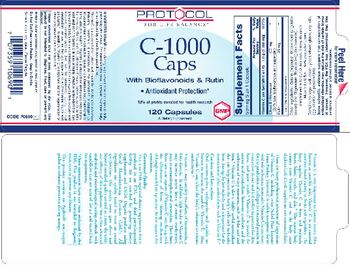C-1000 Caps With Bioflavonoids & Rutin
This product is no longer available
This product was taken off the market by the manufacturer around Aug 09, 2012

Product Type
supplement
Packaging Size
Serving Size
1.0 Capsule(s),
UPC
707359106901
Ingredients
| vitamin c | 1.0 | g |
| citrus bioflavonoids | 100.0 | mg |
| rutin | 25.0 | mg |
Description
Adult (18 - 50 Years) Dairy Free Sugar Free Gluten Free NP A Dietary Supplement - Antioxidant Protection
10% of profits donated for health research Guaranteed Quality
This is an FDA-regulated dietary supplement that is produced in an FDA- and third party-inspected facility. We are certified for producing dietary supplements and USDA Organic products using Good Manufacturing Practices (GMP). All ingredients are quality tested to meet or exceed specifications. Our quality team goes above and beyond standard quality control to ensure the safety and efficacy of this supplement. We utilize advanced analytical and microbiological testing methods, with capabilities that are state-of-the-art and exceed basic lab requirements.
Made in the U.S.A. Natural color variations may occur in this product. Peel Here for more information Please Recycle. Some scientific evidence suggests that consumption of antioxidant vitamins may reduce the risk of certain forms of cancer. However, the FDA has determined that this evidence is limited and not conclusive. Vitamin C is a water soluble nutrient well known for its vital role in human immunity. Vitamin C is necessary for the production of collagen (a structural protein in connective tissue) and is therefore important for skin, bone, and joint health. Vitamin C is needed for amino acid metabolism, hormone synthesis, and the utilization of many nutrients, such as folic acid and iron. Vitamin C is also a highly effective antioxidant that can protect the body's cells and molecules from damage by free radicals and reactive oxygen species that can be generated during normal metabolism, as well as through exposure to environmental toxins and pollutants. In addition, Vitamin C is important for the regeneration of other antioxidants such as Vitamin E. Vitamin C is very important to human health. Also known as ascorbic acid, Vitamin C is an essential nutrient found mainly in fruits and vegetables. The body requires Vitamin C to form and maintain bones, blood vessels, and skin. The human body cannot store Vitamin C, and so the body soon depletes itself if fresh supplies are not consumed daily.
There are many professional advocates of large doses of Vitamin C, including twice Nobel Prize laureate Linus Pauling. Vitamin C is widely recognized for its vital role in human immunity. Vitamin C is necessary for the production of collagen (a structural protein in connective tissue) and is therefore important for skin, bone, and joint health. Vitamin C is needed for amino acid metabolism, hormone synthesis, and the utilization of many nutrients, such as folic acid and iron. Vitamin C is also a highly useful antioxidant that can help protect the body's cells and molecules from damage by free radicals, and is important for the restoration of other antioxidants, such as Vitamin E. CODE P0690 V3 Store in a cool, dry place. GMP SUGGESTED USAGE: As a dietary supplement, take one capsule daily, preferably with meals. For intensive use, take 1 capsules 2-3 times daily, or as directed by a health care practitioner.
Formulation
This product contains an Ageless(R) anti-oxygen packet to enhance protection during storage. Contains no sugar, salt, starch, yeast, wheat, gluten, soy, milk, egg, shellfish, or preservatives.
Precautions
Do Not Eat Freshness Packet. Keep in Bottle. Cautions and Interactions
Oral contraceptives, cyclosporine and aspirin are known to increase the need for Vitamin C. Also, Vitamin C may affect the body's tolerance to nitrate medications.
Vitamin C may amplify the effects of furosemide, a loop diuretic. In addition, high intake of Vitamin C may increase serum levels of certain medications, such as acetaminophen and tetracycline. There have been rare case reports of Vitamin C interfering with the effectiveness of blood thinning medications, although recent follow up studies do not support this association.